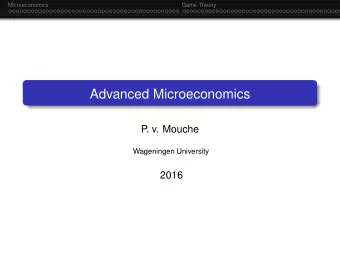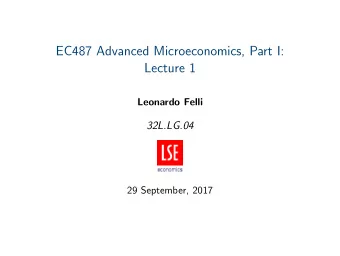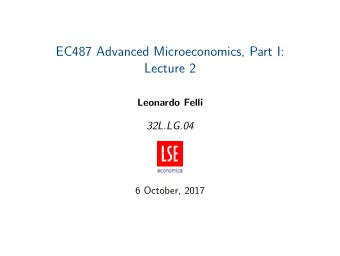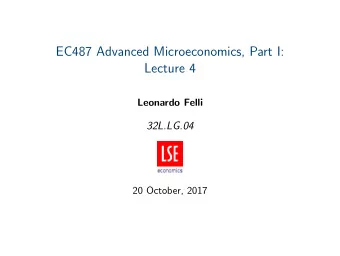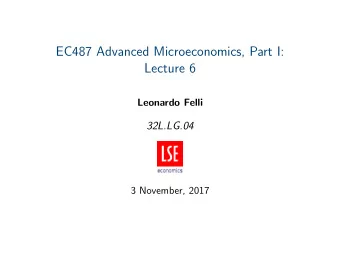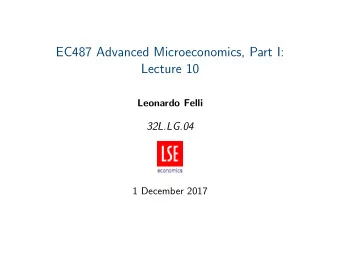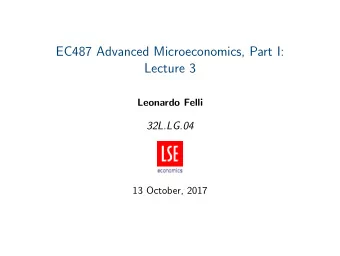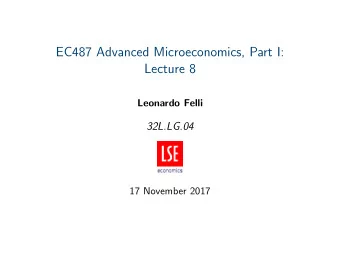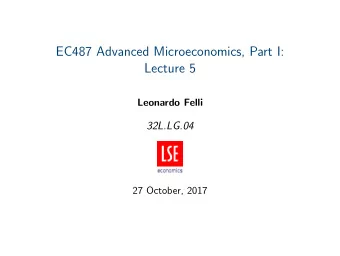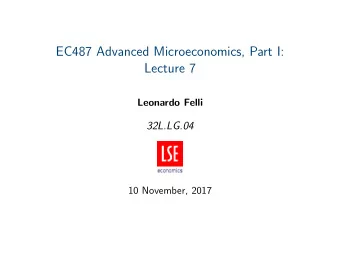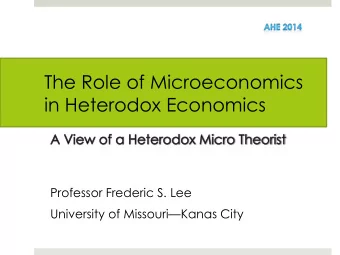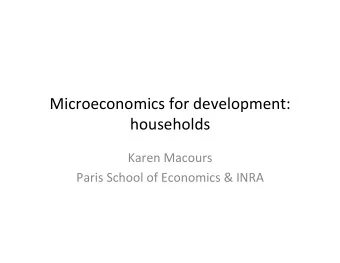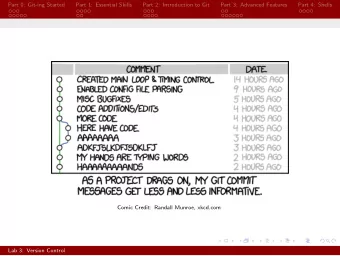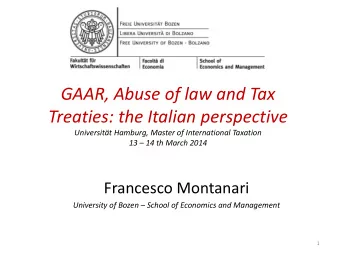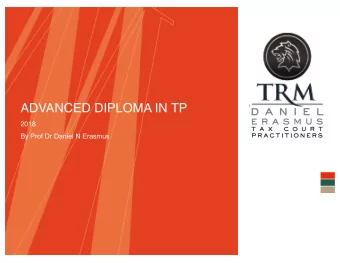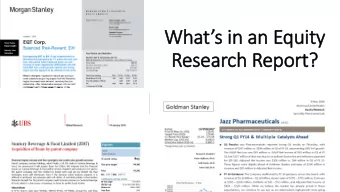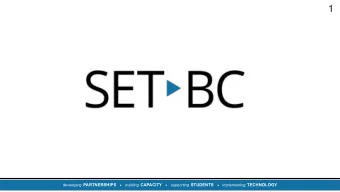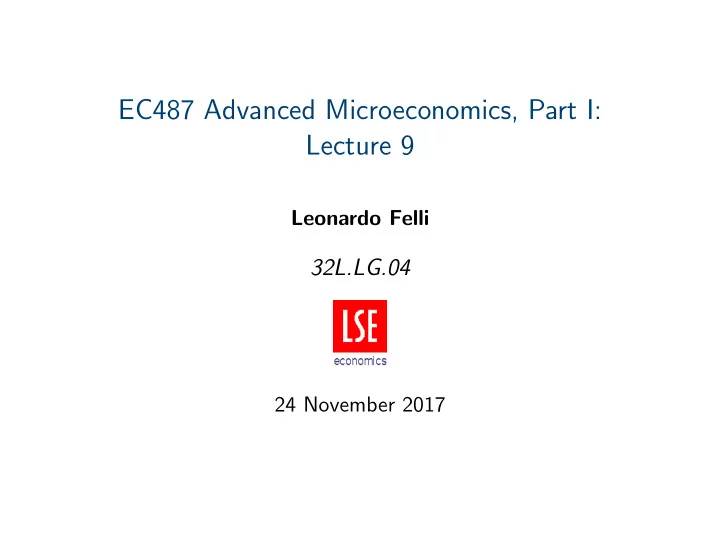
EC487 Advanced Microeconomics, Part I: Lecture 9 Leonardo Felli - PowerPoint PPT Presentation
EC487 Advanced Microeconomics, Part I: Lecture 9 Leonardo Felli 32L.LG.04 24 November 2017 Bargaining Games: Recall Two players, i { A , B } are trying to share a surplus. The size of the surplus is normalized to 1. Payoffs to
EC487 Advanced Microeconomics, Part I: Lecture 9 Leonardo Felli 32L.LG.04 24 November 2017
Bargaining Games: Recall ◮ Two players, i ∈ { A , B } are trying to share a surplus. ◮ The size of the surplus is normalized to 1. ◮ Payoffs to the players in case of disagreement are normalized to 0. ◮ Denote ( δ A , δ B ) the parties’ discount factors: 0 ≤ δ i ≤ 1 , ∀ i ∈ { A , B } ; ◮ Denote: ◮ x the share of the pie to party A ; ◮ (1 − x ) the share of the pie to party B . Leonardo Felli (LSE) EC487 Advanced Microeconomics, Part II 24 November 2017 2 / 65
T periods alternating offers bargaining ◮ Assume for simplicity that δ A = δ B = δ . ◮ Assume now that the game lasts for T periods where T is even. ◮ We compute the Subgame Perfect Equilibrium of the bargaining game. Leonardo Felli (LSE) EC487 Advanced Microeconomics, Part II 24 November 2017 3 / 65
T periods alternating offers bargaining (cont’d) Extensive form: ◮ Odd periods n ≤ T − 1 : Stage I : A makes an offer x A to B ; Stage II : B observes the offer and can accept or reject it; If the offer is accepted then x = x A and the game terminates and the players payoffs are: Π A ( x A , y ) = δ n − 1 x A Π B ( x A , y ) = δ n − 1 (1 − x A ) If the offer is rejected the game moves to Stage I of the following period. Leonardo Felli (LSE) EC487 Advanced Microeconomics, Part II 24 November 2017 4 / 65
T periods alternating offers bargaining (cont’d) ◮ Even periods τ < T: Stage I : B makes an offer x B to A ; Stage II : A observes the offer and can accept or reject it; If the offer is accepted then x = x B and the game terminates and the players payoffs are: Π A ( x B , y ) = δ τ − 1 x B Π B ( x B , y ) = δ τ − 1 (1 − x B ) If the offer is rejected the game moves to Stage I of the following period. Leonardo Felli (LSE) EC487 Advanced Microeconomics, Part II 24 November 2017 5 / 65
T periods alternating offers bargaining (cont’d) ◮ Period T: Stage I : B makes an offer x B to A ; Stage II : A observes the offer and can accept or reject it; If the offer is accepted then x = x B and the game terminates and the players payoffs are: Π A ( x B , y ) = δ T − 1 x B Π B ( x B , y ) = δ T − 1 (1 − x B ) If the offer is rejected the game ends and the players’ payoffs are: Π A ( x B , n ) = 0 Π B ( x B , n ) = 0 . Leonardo Felli (LSE) EC487 Advanced Microeconomics, Part II 24 November 2017 6 / 65
T periods alternating offers bargaining (cont’d) Notice that: ◮ In the T -th period (even) B makes an offer and the size of the pie is δ T − 1 . Player B makes a take-it-or-leave-it offer: Π A = 0 δ T − 1 . Π B = ◮ In the ( T − 1)-th period (odd) A makes an offer and the share of the pie that will not be available any more next period is ( δ T − 2 − δ T − 1 ). Player A makes a take-it-or-leave-it offer on this share: ( δ T − 2 − δ T − 1 ) Π A = 0 + δ T − 1 Π B = + 0 . Leonardo Felli (LSE) EC487 Advanced Microeconomics, Part II 24 November 2017 7 / 65
T periods alternating offers bargaining (cont’d) ◮ . . . ◮ In the second period (even) B makes an offer and the share of the pie that will not be available any more next period is ( δ − δ 2 ). Player B makes a take-it-or-leave-it offer on this share: ( δ T − 2 − δ T − 1 ) Π A = 0 + + + 0 . . . δ T − 1 ( δ − δ 2 ) . Π B = + 0 + . . . + ◮ In the first period (odd) A makes an offer and the share of the pie that will not be available any more next period is (1 − δ ). Player A makes a take-it-or-leave-it offer on this share: ( δ T − 2 − δ T − 1 ) Π A = + + 0 + (1 − δ ) . . . δ T − 1 ( δ − δ 2 ) Π B = + . . . + + 0 . Leonardo Felli (LSE) EC487 Advanced Microeconomics, Part II 24 November 2017 8 / 65
T periods alternating offers bargaining (cont’d) In other words, the SPE payoffs are: Π A = (1 − δ ) + ( δ 2 − δ 3 ) + . . . + ( δ T − 2 − δ T − 1 ) Π B = ( δ − δ 2 ) + ( δ 3 − δ 4 ) + . . . + ( δ T − 3 − δ T − 2 ) + δ T − 1 . We can re-write both payoffs as: Π A = (1 − δ ) (1 + δ 2 + δ 4 + . . . + δ T − 2 ) Π B = (1 − δ ) δ (1 + δ 2 + δ 4 + . . . + δ T − 4 ) + δ T − 1 . Leonardo Felli (LSE) EC487 Advanced Microeconomics, Part II 24 November 2017 9 / 65
T periods alternating offers bargaining (cont’d) Recall that: 1 + a + a 2 + a 3 + . . . + a n = 1 − a n +1 1 − a Let now a = δ 2 then we have: (1 + δ 2 + δ 4 + . . . + δ T − 2 ) = 1 − ( δ 2 )( T − 2 +1 ) = 1 − δ T 2 1 − δ 2 1 − δ 2 (1 + δ 2 + δ 4 + . . . + δ T − 4 ) = 1 − ( δ 2 )( T − 4 +1 ) = 1 − δ T − 2 2 1 − δ 2 1 − δ 2 Leonardo Felli (LSE) EC487 Advanced Microeconomics, Part II 24 November 2017 10 / 65
T periods alternating offers bargaining (cont’d) The SPE payoffs are then: Π A = (1 − δ ) 1 − δ T 1 − δ 2 Π B = (1 − δ ) δ 1 − δ T − 2 + δ T − 1 . 1 − δ 2 Recall also that (1 − δ 2 ) = (1 − δ ) (1 + δ ) . Leonardo Felli (LSE) EC487 Advanced Microeconomics, Part II 24 November 2017 11 / 65
T periods alternating offers bargaining (cont’d) When T is even agreement is reached in the first period and the SPE payoffs are: Π A = 1 − δ T Π B = 1 − Π A = δ + δ T 1 + δ 1 + δ Strategies for t ≤ T remaining periods are: If t is odd ◮ A offers share x A = 1 − δ t 1 + δ ; ◮ B accepts any share x ′ ≤ (1 − δ t ) and rejects x ′ > (1 − δ t ) 1 + δ 1 + δ If t is even: ◮ B offers share x A = δ − δ t 1 + δ ; ◮ A accepts any share x ′ ≥ ( δ − δ t ) and rejects x ′ < ( δ − δ t ) 1 + δ 1 + δ Leonardo Felli (LSE) EC487 Advanced Microeconomics, Part II 24 November 2017 12 / 65
T periods alternating offers bargaining (cont’d) When T is odd agreement is reached in the first period and the SPE payoffs are: Π A = 1 + δ T Π B = δ − δ T 1 + δ 1 + δ Strategies for t ≤ T remaining periods are: If t is odd: ◮ A offers share x A = 1 + δ t 1 + δ ; ◮ B accepts any share x ′ ≤ (1 + δ t ) and rejects x ′ > (1 + δ t ) 1 + δ 1 + δ If t is even: ◮ B offers share x A = δ + δ t 1 + δ ; ◮ A accepts any share x ′ ≥ ( δ + δ t ) and rejects x ′ < ( δ + δ t ) 1 + δ 1 + δ Leonardo Felli (LSE) EC487 Advanced Microeconomics, Part II 24 November 2017 13 / 65
Alternating offers bargaining ∞ horizon (Rubinstein 1982): Consider the general case where δ A and δ B might differ. Extensive form: ◮ Odd periods: Stage I : A makes an offer x A to B ; Stage II : B observes the offer and can accept or reject it; If the offer is accepted then x = x A and the game terminates; If the offer is rejected the game moves to Stage I of the following period. Leonardo Felli (LSE) EC487 Advanced Microeconomics, Part II 24 November 2017 14 / 65
Alternating offers bargaining ∞ horizon (cont’d) ◮ Even periods: Stage I : B makes an offer x B to A ; Stage II : A observes the offer and can accept or reject it; If the offer is accepted then x = x B and the game terminates; If the offer is rejected the game moves to Stage I of the following period. Leonardo Felli (LSE) EC487 Advanced Microeconomics, Part II 24 November 2017 15 / 65
Alternating offers bargaining ∞ horizon (cont’d) Payoffs: ◮ If parties agree on x in period n : Π A ( σ A , σ B ) = δ n − 1 x , A Π B ( σ A , σ B ) = δ n − 1 (1 − x ) , B ◮ or if they do not agree: Π i ( σ A , σ B ) = 0 i ∈ { A , B } . Leonardo Felli (LSE) EC487 Advanced Microeconomics, Part II 24 November 2017 16 / 65
Alternating offers bargaining ∞ horizon (cont’d) ◮ Nash equilibria: any share of the surplus x ∈ [0 , 1] . ◮ Strategies: ◮ A offers share x A = x ∈ [0 , 1] in the first period; ◮ B accepts any share x ′ ≤ x and rejects any share x ′ > x in the first period; ◮ player i offers share x i = x , for i ∈ { A , B } in any other period; ◮ player − i accepts any offer x i , i ∈ { A , B } such that x A ≥ x or x B ≤ x and rejects all other offers in every other period. Leonardo Felli (LSE) EC487 Advanced Microeconomics, Part II 24 November 2017 17 / 65
Alternating offers bargaining ∞ horizon (cont’d) ◮ Subgame Perfect Equilibrium Outcome: Agreement is reached in the first period and the equilibrium payoffs are: 1 − δ B Π A = 1 − δ A δ B and Π B = δ B (1 − δ A ) 1 − δ A δ B Leonardo Felli (LSE) EC487 Advanced Microeconomics, Part II 24 November 2017 18 / 65
Alternating offers bargaining ∞ horizon (cont’d) ◮ Strategies: 1 − δ B ◮ A always offers share x A = in odd periods; 1 − δ A δ B ◮ B accepts any share x ′ ≤ (1 − δ B ) and rejects any share 1 − δ A δ B x ′ > (1 − δ B ) in odd periods; 1 − δ A δ B ◮ B offers share x B = δ A (1 − δ B ) in even periods; 1 − δ A δ B ◮ A accepts any offer x ′ ≥ δ A (1 − δ B ) and rejects any share 1 − δ A δ B x ′ < δ A (1 − δ B ) in even periods. 1 − δ A δ B Leonardo Felli (LSE) EC487 Advanced Microeconomics, Part II 24 November 2017 19 / 65
Recommend
More recommend
Explore More Topics
Stay informed with curated content and fresh updates.
